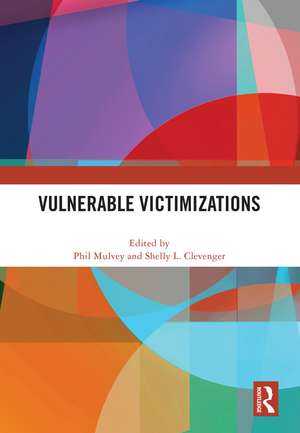Vulnerable Victimizations
Editat de Phil Mulvey, Shelly L. Clevengeren Limba Engleză Hardback – 6 sep 2023
The scholarship focuses on the overall victimization experience, and at the same time is also centered on the victimization experiences of historically ignored and/or marginalized groups. Victimization of vulnerable individuals in the United States is increasing at a moment when marginalized groups continue to confront legislative and policy reforms that would undermine their liberty. It is as important now, as it has ever been, for the field of victimology to consider those who historically may not have the loudest (or any) voice to spotlight and investigate their experiences.
Vulnerable Victimizations will be a key resource for academics, researchers, and advanced students of Victimology, Criminology and Criminal Justice. The chapters included in this book were originally published in Victims & Offenders.
Preț: 1007.54 lei
Preț vechi: 1228.71 lei
-18% Nou
Puncte Express: 1511
Preț estimativ în valută:
192.82€ • 200.56$ • 159.18£
192.82€ • 200.56$ • 159.18£
Carte tipărită la comandă
Livrare economică 15-29 aprilie
Preluare comenzi: 021 569.72.76
Specificații
ISBN-13: 9781032552385
ISBN-10: 1032552387
Pagini: 272
Dimensiuni: 178 x 254 x 16 mm
Greutate: 0.66 kg
Ediția:1
Editura: Taylor & Francis
Colecția Routledge
Locul publicării:Oxford, United Kingdom
ISBN-10: 1032552387
Pagini: 272
Dimensiuni: 178 x 254 x 16 mm
Greutate: 0.66 kg
Ediția:1
Editura: Taylor & Francis
Colecția Routledge
Locul publicării:Oxford, United Kingdom
Public țintă
Postgraduate and UndergraduateCuprins
Introduction 1. A Veneer of Idyllic but [Un]safe Dirt Roads: Young Women’s Pathways to Safety and Belonging behind Prison Walls 2. “Nevertheless She Persisted:” Confronting the Silencing and Reproduction of Gender-Based Violence among U.S. Asylum Seekers 3. Differences in Adverse Childhood Experiences and Coercive Control among Native American and Non-Native American Justice-Involved Women 4. Understanding Intimate Partner Cyber Abuse across Partnership Categories Based on Gender Identity and Sexual Orientation 5. Queering Title IX: Protecting Transgender and Gender Non-Conforming Students from Discrimination, Harassment, and Violence 6. Risk and Danger among the “Invisible”: Bisexual IPV Victimization, Lifestyle Factors, and Feelings of Marginalization 7. Navigating Biases and Distrust of Systems: American and Canadian Intimate Partner Violence Service Providers’ Experiences with Trans and Immigrant Women Clients 8. Fear of Victimization among LGBQ, Non-Binary, and Transgender College and University Students in the United States 9. Understanding Predictors of Violent and Non-Violent Crime Victimization among Asian-American/Pacific Islanders 10. Tough or No Love? Parental Migration and Children’s Exposure to Corporal Punishment and Neglect in Rural China 11. (Under)Cover and Uncovered: Muslim Women’s Resistance to Islamophobic Violence
Notă biografică
Philip Mulvey is Associate Professor in the Department of Victim Studies at Sam Houston State University. His academic work focuses on the experiences of individuals with mental illness under formal social control, as well as other marginalized groups, and justice policies that impact these individuals. Prior to entering academia, he was the program manager at the Health Disparities and Public Policy program at Northwestern University.
Shelly L. Clevenger is the Department Chair for the Department of Victim Studies at Sam Houston State University. Her area of expertise is cybervictimization, gender, and interpersonal victimization. She has peer-reviewed publications and books on these topics. She also is the receipient of many national awards.
Shelly L. Clevenger is the Department Chair for the Department of Victim Studies at Sam Houston State University. Her area of expertise is cybervictimization, gender, and interpersonal victimization. She has peer-reviewed publications and books on these topics. She also is the receipient of many national awards.
Descriere
This edited volume showcases research on vulnerable victimizations, or more specifically, on individuals and/or populations that, due to their status, have less power in society, are socially controlled in unique ways in the criminal–legal system, or are members of marginalized groups.
